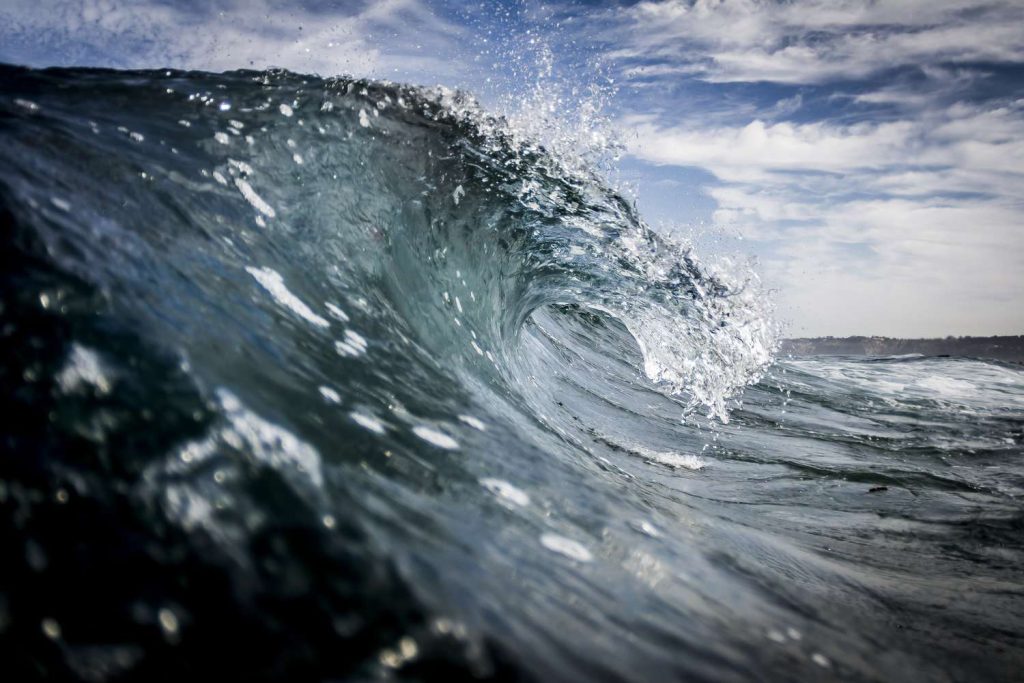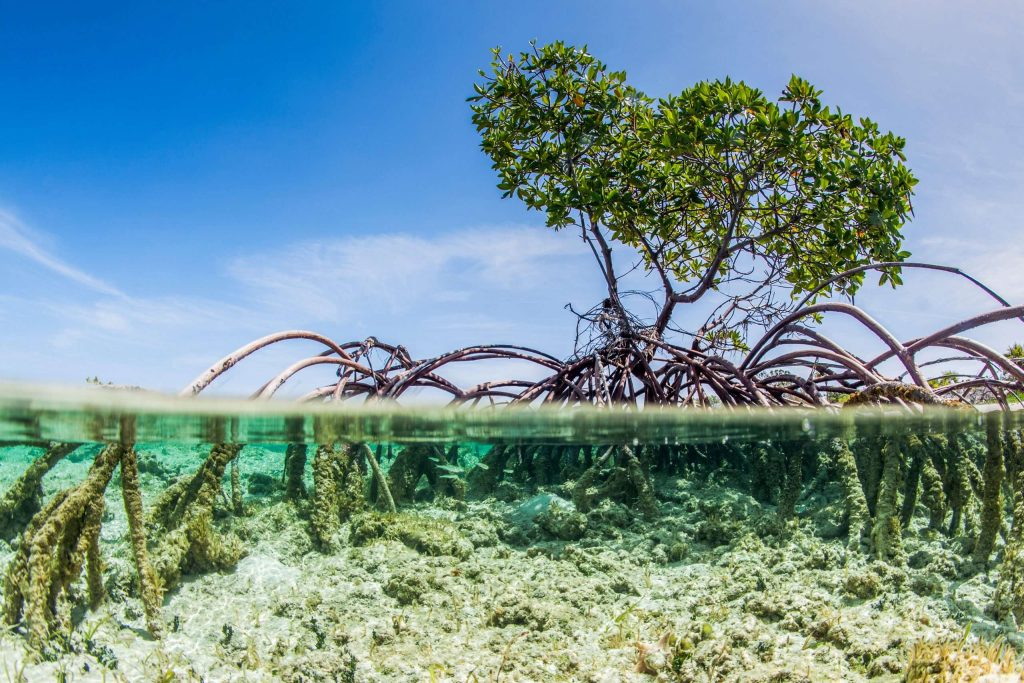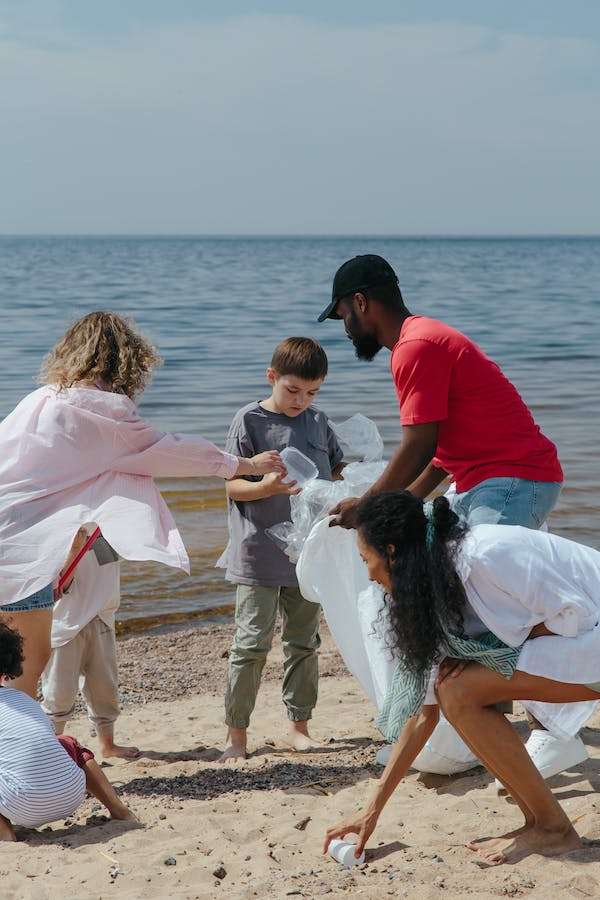The ocean is our planet’s largest ecosystem. It covers 71% of the Earth’s surface and contains about 97% of the Earth’s water (IPCC, 2019). Almost 2.4 billion people live within 100 km of the ocean globally and interact directly with it regularly (United Nations Ocean Conference). Unfortunately, our global ocean faces numerous pressures that affect its health, management, and the industries and communities that depend on it (Arthur et al., 2021).

Source: Jeff Hester/Ocean Image Bank
What Does Ocean Health Entail?
Simply put, ocean health refers to the state of the ocean ecosystem. It is the condition of a system that is self-maintaining, vigorous, resilient to externally imposed pressures, and able to sustain services for humans. It contains healthy organisms and populations, and adequate functional diversity and functional response diversity (Tett et al., 2013). Human health and well-being in this context are considered a physical, social, and mental state, dependent, at least in part, upon marine and other ecosystem services, provided by the natural world. The health of our oceans directly impacts our well-being and the prosperity of human populations globally.
why is ocean health important for humans?
A healthy ocean provides us with resources we rely on daily, from food to most of the oxygen we breathe to medicines. Through the fishing and boating industry, marine renewable energy, tourism and recreation, and ocean transport, our coastal and marine waters support millions of jobs. For instance, Australia’s marine environment which includes the Great Barrier Reef is the third largest in the world, with an exclusive economic zone covering 10.2 million square kilometers. Its ‘blue economy’ generates more than $118 billion annually and supports 462,000 jobs. The ocean bed is a rich repository for archaeology.
Similarly, our oceans provide protection from extreme weather events and climate fluctuations, nutrient recycling, and maritime heritage. The ocean and its resources are a part of our common heritage and an important part of many cultures, whose beliefs and practices are closely associated with the marine and coastal environment. Oceans are special places held in trust for future generations.
Oceans have a vital role to play as a source of joy, recreation, and spiritual and mental well-being (Fleming et al., 2019). We enjoy healthy activities such as swimming, surfing, sailing, sea kayaking, kite surfing, and diving. The health benefits of exercising in the ocean or spending time at the seashore form part of the ‘Blue Gym Concept‘.

Source: Ben Jones/Ocean Image Bank
Further health benefits
Furthermore, studies suggest that merely viewing the ocean from home is associated with a positive effect on mental health. Another study found that patients with cystic fibrosis experienced fewer pulmonary flare-ups when inhaling prescribed hypertonic saline – a strong salt water solution mimicking what we inhale at the seaside. The research was prompted by Australian patients with cystic fibrosis telling their doctors they could breathe more easily after surfing.
Marine plants and organisms offer a natural source of medicines, food additives, and cosmetics. For instance, seaweed’s rich concentration of vitamins and minerals actively enhance skin health. Seaweed serves as a vital nutritional source for humans, complementing a diverse array of seafood options.
Fish is a rich source of Omega-3 fatty acids, which are essential for healthy brain function and healthy brain development, both in the womb and in early childhood. Researchers have found that many brain-related conditions may be prevented or even treated by good intakes of Omega-3 fats, including conditions such as dementia, alzheimer’s, depression, dyslexia, and ADHD in children. The deep ocean has already given us compounds to treat cancer, inflammation, and nerve damage. This is an area of research that is still developing, with great potential for the future.
how ocean health affects health aspects separately
Ocean pollution like plastics in the ocean pose a clear and present danger to human health. It is causing disease, disability, and premature death in countries around the world today. Chemical additives and adsorbed chemicals can leach out of microplastic and nanoplastic particles. They can enter the tissues of marine organisms that ingest these particles, including species consumed by humans as seafood.
Plastic pollution and microplastics are a source of poisoning of the ocean. These ocean contaminants have the potential to bring about a range of human health issues, such as cardiovascular disease, developmental defects and neurotoxicity, various forms of cancer, and an increased risk of mortality from chronic diseases.
Additionally, human exposure to harmful algal bloom (HAB) toxins occur through skin or respiratory contact when swimming or visiting beaches during algal blooms. People have reported skin rashes, respiratory irritation such as sneezing, and a burning or itching in the nose or throat. Further, fecal-derived bacteria in marine environments are responsible for a wide range of acute and chronic diseases. These include diarrhea and gastroenteritis, ocular and respiratory infections, hepatitis, and wound infections. Transmission of disease occurs mainly through ingestion of contaminated water and consumption of contaminated seafood.
Ways To Restore and Protect Our Ocean’s Health
- Ocean literacy among people of all ages and from diverse countries, cultures, and economic backgrounds is necessary. This will empower individuals to have a more responsible and informed behavior towards the ocean and its resources. Moreover, it promotes a deeper understanding of ocean health and our individual and collective responsibilities to protect it. For instance, in Australia, the National Scientific Research Agency operates critical national research infrastructure such as the Marine National Facility, which also plays an important role in marine education, training, and communication.
- Choose sustainably sourced seafood options. The World Wildlife Fund estimates that three-quarters of the world’s fisheries are fully exploited or overfished. One way to say “no” to unsustainably sourced seafood is to opt for sustainable seafood. We can reduce our overall seafood consumption, especially for overfished species or unsustainably harvested seafood.

- Pick up garbage and litter around beaches. Garbage and litter destroy marine biodiversity, smother aquatic plants and corals, interfere with their growth, and detract from the beauty of our oceans. For an insight into how the ocean appears in the eyes of fishes, click here.
- To protect the ocean, we ought to take prompt proactive steps to prevent plastic pollution at its source. Rwanda, Kenya, and some jurisdictions in the United States have banned single-use plastic bags altogether. These are model programs that have the potential to extend to other countries. Again, we should patronise businesses that prioritise sustainability and offer plastic-free alternatives.
- Reduce our carbon footprint. Our oceans absorb approximately 93% of excess carbon dioxide in our atmosphere which results in ocean acidification when in excess. The rise in acidity levels is devastating for marine creatures which often suffer as a result. You can significantly reduce your carbon footprint by initiating simple changes, such as opting for local and seasonal produce, minimising unnecessary purchases (especially fast fashion), and decreasing food waste.
Furthermore reasons our ocean’s health is important
- Sustainable ocean campaigns such as beach clean-up drives, recycling initiatives, and educational workshops for the community are necessary.
- Equally important is supporting companies and organisations actively working to protect and restore our oceans’ health.
- Effective collaboration and the government’s increased investments in scientific research to measure and monitor ocean warming.
- Create marine-protected areas. Show empathy for the ocean. The designation of new marine protected areas around the world will safeguard critical ecosystems, protect vulnerable fish stocks, and enhance human health and well-being. The creation of Marine Protected Areas is an important manifestation of national and international commitment to protecting the health of the seas.

Source: Pexels
moving forward with better ocean health
To sum up, a healthy ocean boosts economies, enhances tourism, restores fish stocks, prevents disease, extends longevity, and enhances well-being. Rethinking the ocean is a key enabler in addressing these challenges, bringing benefits that will last for centuries.
Ocean pollution, like all forms of pollution, has disproportionately severe health impacts in developing countries that are dependent on the oceans for their food and livelihood. By maintaining the ocean’s health, we safeguard our well-being and that of future generations, ensuring a legacy of harmony and abundance for all who call this planet home.
why Is it essential that we focus on this issue?
Our actions have actively shaped the present state of the ocean. Human activities, such as pollution and overfishing have impacted the ocean’s biodiversity. Improvements in the state of our oceans directly contribute to human health and well-being by providing essential resources, supporting ecosystem services, and mitigating the impacts of environmental stressors such as climate change.
Moreover, nearly 3 billion people, mostly living in developing nations depend on marine resources for nutrition, livelihood, foreign exchange, and more. The health impacts of ocean pollution fall disproportionately on vulnerable populations in the Global South. Thus the responsibility to protect our ocean falls on everyone: governments, organisations, and the general public. Restoring the fragile beauty of our ocean demands bold, evidence-based action to stop ocean pollution at its source.
A Thrivable Framework for our ocean’s health
The THRIVE Project is an international research, advocacy, and educational organisation that explores current issues and challenges to help transform society towards ‘thrivability‘ – a concept beyond sustainability. THRIVE recognises that human happiness can sometimes compete with environmental well-being, so we use our Ciambella chart to illustrate the fair-share compromise in the ‘thrivable zone‘.
Safeguarding human well-being in all domains is paramount to THRIVE‘s mission. All actions taken to maintain a healthy ocean will advance the attainment of multiple SDGs. Moreover, understanding the issues and addressing ocean health is integral to achieving the broader objectives of SDG 3, which comprises promoting health and well-being for present and future generations. Ocean health is also linked to SDG 14 which aims for sustainable use of the ocean’s ecosystems and resources.
The THRIVE Platform, which comes from the THRIVE Framework, evaluates the sustainability performance of companies or entities, highlighting the most sustainable path forward. This platform allows users to measure what matters using predictive analyses. To learn more about thrivability or hear more from the THRIVE project, you can subscribe to our free newsletter, check out our informative podcast series, watch some of our educational YouTube content, or come along to our Thrivability Matters Webinar. If the health of the ocean and ocean governance is of interest to you, join the THRIVE Project’s Ocean Governance outreach cluster.























